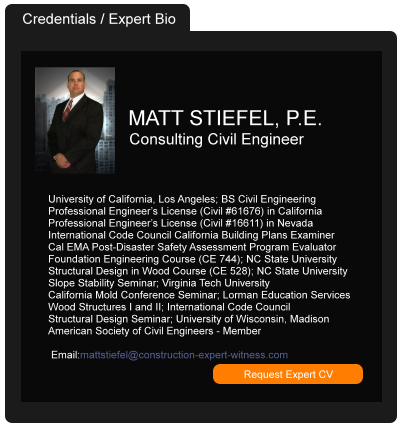Is It Time to Revisit Construction Defects in Kentucky?
December 11, 2013 —
CDJ STAFFThe Kentucky Supreme Court ruled in 2010 that faulty workmanship on a construction project could not be considered an accident under a commercial general liability policy. The first reason they cited, according to Carl A. Salisbury of Kilpatrick Townsend & Stockton LLP, was that a majority of states had concluded that “claims of faulty workmanship, standing alone, are not ‘occurrences’ under CGL policies.” Mr. Salisbury points out a problem with that: “an overwhelming majority of state Supreme Courts that have considered the question have held that faulty workmanship can be (and usually is) accidental and, therefore, is a covered ‘occurrence.’’ He also notes that in four states, the legislatures have passed laws confirming that faulty workmanship is an occurrence.
The “majority viewpoint” cited by the Kansas Supreme Court is currently held by four other states, while twenty states hold the view that construction defects are accidents and thus occurrences. Since 2010, five states have reversed their stance, coming to what is now the clear majority view, including South Carolina. The Kansas court relied on a South Carolina decision that Mr. Salisbury described as “since repudiated” by “both the legislature and Supreme Court of that state.”
Read the court decisionRead the full story...Reprinted courtesy of
Five Keys to Driving Digital Transformation in Engineering and Construction
January 02, 2019 —
Rob Phillpot - Construction ExecutiveEngineering and construction companies increasingly find themselves navigating an era of disruptive and transformative change driven by technology. And with the industry going strong and construction employment recently reaching a 10-year high, more companies recognize that it is time to embrace the efficiencies digital transformation brings, in large part to protect or enhance their competitive position.
A report from the Global Industry Council notes that modern technology is moving to the strategic center of E&C business models as part of an evolutionary process.
Reprinted courtesy of
Rob Phillpot, Construction Executive, a publication of Associated Builders and Contractors. All rights reserved.
Read the court decisionRead the full story...Reprinted courtesy of
Colorado HB 13-1090: Concerning Payment of Amounts Due Under a Construction Agreement
February 21, 2013 —
David M. McLain — Higgins, Hopkins, McLain & Roswell, LLCOn January 17, 2013 Representative Fischer introduced House Bill 13-1090 into the Colorado House of Representatives. HB 1090 was assigned the House Business, Labor, Economic and Workforce Development Committee.
The bill, sponsored by Senator Tochtrop in the Senate, sets the following requirements for both private and public construction contracts:
The owner and contractor must make regular progress payments approximately every 30 days to contractors and subcontractors for work actually performed.
To receive the progress payments, the contractor and subcontractor must submit a progress payment invoice plus any required documents.
A contractor must pass on the progress payment to the subcontractor within 5 days or by the end of the billing cycle.
Interest accrues on unpaid progress payments.
A contract may extend a billing cycle to 60 days, but the contract must duly warn of this.
Read the court decisionRead the full story...Reprinted courtesy of
David M. McLainmclain@hhmrlaw.com
Construction and Contract Issues Blamed for Problems at Anchorage Port
August 27, 2013 —
CDJ STAFFA third-party audit of the construction at the Port of Anchorage has found fault with the design provided by the engineers. In response, PND, the engineering firm involved, has claimed that it was not their design, but faulty construction of it that lead to an interruption in the construction project.
Separately, the Office of the Inspector General has called into question how MARAD, the agency which oversaw the port construction, handled the planning and contracts for the project.
Control of the project has been taken over by the Municipality of Anchorage, and they have called into question PND’s open cell sheet pile design and PND’s design of the dock infrastructure. Simpson, Gumpertz and Heger reviewed the design, comparing it to a design provided by CH2M Hill, and found that the PND design was inadequate. A contract was subsequently awarded to CH2M Hill.
Read the court decisionRead the full story...Reprinted courtesy of
ASHRAE Approves Groundbreaking Standard to Reduce the Risk of Disease Transmission in Indoor Spaces
July 10, 2023 —
ASHRAEATLANTA, June 27, 2023 (GLOBE NEWSWIRE) -- ASHRAE announced the approval for publication of its highly anticipated standard to reduce the risk of airborne infectious aerosol transmission in buildings, bringing numerous benefits to occupants and promoting healthier environments.
ASHRAE Standard 241, Control of Infectious Aerosols establishes minimum requirements to reduce the risk of disease transmission by exposure to infectious aerosols in new buildings, existing buildings, and major renovations. Infectious aerosols are tiny, exhaled particles that can carry pathogens that cause infections or disease. These particles are so small that they can remain in the air for long periods of time. Use of this standard could reduce exposure to the SARS-COVID-2 virus, which causes COVID-19, the flu virus and other pathogens. Standard 241 provides requirements for many aspects of air system design, installation, operation, and maintenance.
Standard 241 available now for
presale in the ASHRAE Bookstore.
About ASHRAE
Founded in 1894, ASHRAE is a global professional society committed to serve humanity by advancing the arts and sciences of heating ventilation, air conditioning, refrigeration, and their allied fields.
For more information and to stay up-to-date on ASHRAE, visit ashrae.org and connect on
Instagram,
LinkedIn,
Facebook,
Twitter and
YouTube.
Read the court decisionRead the full story...Reprinted courtesy of
Texas Supreme Court Declines to Waive Sovereign Immunity in Premises Defect Case
April 10, 2023 —
Starr M. Forster - Lewis BrisboisHouston, Texas (March 30, 2023) – The Supreme Court of Texas recently upheld a Thirteenth Court of Appeals’ judgment finding that the plaintiffs in a premises defect case brought against the Texas Department of Transportation (TxDOT) had failed to raise a fact issue regarding the creation of a dangerous condition and, consequently, failed to establish waiver of the defendant’s sovereign immunity.
Daniel K. Christ and Nicole D. Salinas v. Tex. DOT, et al., No. 21-0728, 66 Tex. Sup. Ct. J. 306, 2023 Tex. LEXIS 128, at *1 (Feb 10, 2023).
Background
Plaintiffs Daniel Christ and his wife, Nicole Salinas (the Christs), were riding their motorcycle through a construction zone when they collided with a vehicle that crossed into their lane. TxDOT’s traffic control plan for the related construction project called for the placement of concrete barriers between opposing travel lanes; however, once construction on the project began, TxDOT’s contractor determined there was not enough space for the concrete barriers and revised the traffic control plan to substitute yellow stripes and buttons for the concrete barriers. TxDOT never approved the revised traffic control plan in writing; however, TxDOT’s contractor contended TxDOT orally approved of the change. The Christs sued the driver of the other vehicle, TxDOT, and TxDOT’s contractor.
Read the court decisionRead the full story...Reprinted courtesy of
Starr M. Forster, Lewis BrisboisMs. Forster may be contacted at
Starr.Forster@lewisbrisbois.com
City of Birmingham Countersues Contractor for Incomplete Work
March 12, 2014 —
Beverley BevenFlorez-CDJ STAFFBack in December of 2013, WVTM News reported that Chris Woods, a contractor, filed a lawsuit against the City of Birmingham, Alabama, demanding $1.5 million for the West Police Precinct and two other projects he had been contracted on. However, “Birmingham claimed Woods was fired for not completing projects on time and other contract breaches.”
On March 7th, WVTM News reported that the City of Birmingham has filed a counterclaim against Woods, alleging that he “owes $1.2 million for incomplete work.” The city listed his “inability to meet specific construction deadlines and finish either project on time as factors for his termination.” Woods, however, blamed the city for delays, citing multiple design changes requested by Birmingham.
The city’s counterclaim also alleged that “Star Insurance Company, ‘identified major, numerous defects in the work that Woods had performed prior to the termination of the West Precinct Project.’”
Read the full story, December 2013 Article...
Read the full story, March 2014 Article... Read the court decisionRead the full story...Reprinted courtesy of
Event-Cancellation Insurance Issues During a Pandemic
September 07, 2020 —
Lorelie S. Masters & Latosha M. Ellis - Hunton Andrews KurthAs the effects of coronavirus continue, organizations and companies now are considering whether events in late 2020 and early 2021 can take place or need to be converted to virtual events. What insurance effects will those changes and cancellations have? Consideration of these important decisions requires a review of both event-cancellation insurance and a consideration of force majeure and other such issues.
On the insurance front, years ago, many policyholders purchased event-cancellation insurance for events in 2020, 2021, and even as far out as 2024. Such policies, purchased before the middle of March 2020, generally contain explicit coverage “buy-backs” for losses from “communicable disease.” That is, the policyholders paid an extra, specifically identified premium to remove any exclusion for communicable disease from these policies. Typically, these policies do not use the word, “virus”, but rather use “communicable disease”; and exclude neither. Those policies typically cover a specified amount of net profit and include additional coverages for “Cost of Remedial Action”, “Future Marketing Expense”, etc., over and above that specified amount of coverage.
Reprinted courtesy of
Lorelie S. Masters, Hunton Andrews Kurth and
Latosha M. Ellis, Hunton Andrews Kurth
Ms. Masters may be contacted at lmasters@HuntonAK.com
Ms. Ellis may be contacted at lellis@HuntonAK.com
Read the court decisionRead the full story...Reprinted courtesy of


































































